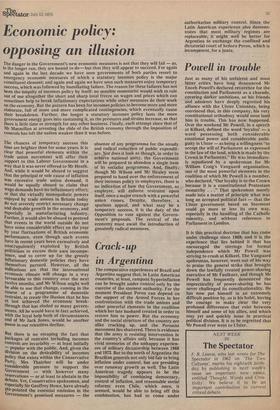Economic policy: opposing an illusion
The danger in the Government's new economic measures is not that they will fail — as, in the longer run, they are bound to do— but that they will appear to succeed. For again and again in the last decade we have seen governments of both parties resort to emergency economic measures of which a statutory incomes policy is the major constituent element; and again and again we have seen such measures enjoy temporary success, which was followed by humiliating failure. The reason for these failures has not been the iniquity of incomes policy by itself: no sensible monetarist would wish to rule out of use altogether the short and sharp total freeze on wages and prices which can sometimes help to break inflationary expectations while other measures do their work on the economy. But the pattern has been for incomes policies to become more and more elaborate, full of more and more complicated contingencies, which eventually cause their breakdown. Further, the longer a statutory incomes policy lasts the more government energy goes into sustaining it, as the pressures and strains increase, so that there is little time or strength for any other business. Finally, each attempt since that of Mr Macmillan at arresting the slide of the British economy through the imposition of controls has left the nation weaker than it was before.
The chances of temporary success this time are brighter than for some years. It is clear that powerful elements within the trade union movement will offer their support to this Labour Government in a Way that it was never offered to Mr Heath. And, while it would be absurd to suggest that the principal or sole cause of inflation Was excessive trade union demand, it would be equally absurd to claim that wage demands have no inflationary effect; or that the virtually monopolistic powers enjoyed by trade unions in Britain today do not severely restrict necessary change and desirable growth in the economy, and especially in manufacturing industry. Further, it would also be absurd to pretend that events in the world outside do not have some considerable effect on the year by year fluctuations of British economic Performance, even though such events have in recent years been excessively and unscrupulously exploited by British Politicians to excuse their own incompetence, and to cover up for the grossly inflationary domestic policies they have ,themselves pursued. However, all the indications are that the international economic climate will change in a way favourable to this country over the next twelve months, and Mr Wilson might well be able to use that change, coming in the course of a programme of domestic restraint, to create the illusion that he has at last achieved the economic breakthrough that has eluded so many governments. All he would have in fact achieved, With the loyal help both of circumstances and of Mr Jack Jones, would be another Pause in our relentless decline.
Rut there is no escaping the fact that Packages of restraint including incomes controls are invariably — at least initially "--Popular with the public. And, given the division on the desirability of incomes Policy that exists within the Conservative Party, Mrs Thatcher will be under considerable pressure to support the Government — with however many reservations — or at least to abstain in the debate. Yet, Conservative spokesmen, and especially Sir Geoffrey Howe, have already Pin-pointed the essential omission in the Government's promised measures — the absence of any programme for the steady and radical reduction of public expenditure. Nor does it look as though, in order to achieve national unity, the Government will be prepared to abandon a single item of its socialist programme. And, finally, though Mr Wilson and Mr Healey seem prepared to hand over the enforcement of their incomes policy to employers, there is no indication of how the Government, as employer, will enforce restraint upon itself, once a major crunch with a powerful union comes. Despite, therefore, a spurious appeal, and what may be a temporary success, it is the duty of the Opposition to vote against the Government's proposals. The revival of the economy must await the introduction of genuinely radical measures.


































 Previous page
Previous page